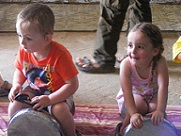Project: Social Services and Support groups
Background Information:
The Familial Dysautonomia (FD) Foundation works to support the well-being and the improvement of the quality of life of its 112 patients and their families. Familial Dysautonomia is an inherited incurable genetic disease which becomes progressively worse as the patients grow older. The younger and the older children suffer from various problems that are extremely difficult to endure. The physical, emotional and financial burdens on the families are heavy. Professional help is an essential part of the package of aid the families and patients receive.
"The Social Services" are one type of crucial aid the foundations supplies. The medical world has recognized that stress is one of the main causes for the development of the horrible "dysautonomic attacks.' Therefore, the social worker plays an important role in the life of the patients and their families by helping out during times of crisis with their support and advice.
The fact that the social worker of the foundation is available to the families eases their burdens significantly. The personal connection that develops between the social worker and the families is another source of strength for them. However, the patients are spread out all over Israel which makes the work more difficult on a personal and a group level. The Foundation does not have a central office or a center where it can hold meetings or run activities. The work of the social worker demands excellent personal skills, knowledge and experience as well as 'the ability to give of themselves and needing great personal strength in the face of troubles. The social worker works in the "field", mostly alone while dealing with the most difficult cases. She is the address for support, listening, knowledge, and most importantly for acceptance and warmth.
Goals of the Project
- Coordinating, supporting and aiding the patients and their families in their quest for improved well-being and quality of life.
- Help in receiving the aid allowed to the patients and families by law.
- Involvement in the development and promotion of solutions for improving the quality of life for the patients with an emphasis on health, education and welfare.
- To make more families and therapists aware of the FD patients' rights by law.
- Strengthening and encouraging the empowerment of the patients as individuals and as a group.
The Support Groups: Support and Empowerment Groups for FD Patients and Their Families
One of the most significant and meaningful aspects of our assistance program is the support group. When the patients from various places in the country, different socio-economic backgrounds, and different levels of religious practice get together, they all share the same experiences of dealing with this difficult and rare disease. This sharing brings them together as a group. Despite being spread out across the country, the members of the group make the effort to come to the meetings and take an active part. Within the framework of the group, an emphasis is put on self-awareness, mutual support, educating and enlightening the patients so they can reach their full potential. All of the support groups are led by professionals such as psychologists, social workers, group leaders and experts in various fields.
Goals of the Group:
- Building of a support system for the patients and their families.
- Providing fun and interesting experiences for the patients and their families for the purpose of building connections among the group members
- Strengthening and supporting the building of personal and group connections as a means of self-fulfillment.
- Enrichment, supplying knowledge, information and skills for aid in dealing with the disease and its implications.
Description of Groups: Secular Groups
- Adult groups: There are two adult groups (18+); one is active in the central area and one in the North. These groups participate in the "On the Way" program towards independence.
- Children's Groups: There are children's groups for children between the ages of 10-13, mixed boys and girls. These groups meet once a month under the guidance of a psychologist.
- Mothers' Group: The mothers' group for mothers of young children (kindergarten age ) meets every two weeks with a social worker and a group leader who specializes in leading groups of parents of children with special needs.
- Adolescents' Group: For the ages of 13-18, mixed boys and girls. They meet once a month with an expert group leader.
- Girls' Group: For ages 10-13, girls only. They meet once a month with a social worker.
Religious Groups:
- Haredi Boys Group: They are a group of about 15 boys who meet once a month.
- Haredi Parents' Group: despite their fears of going public, there are two active groups in the Haredi sector. There is a support group for the fathers and a support group for the mothers. The groups meet once a month.